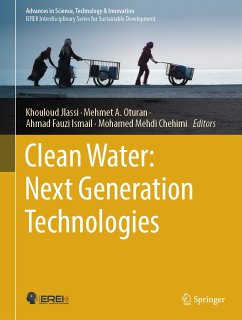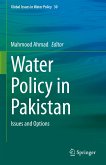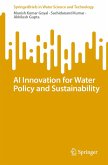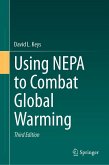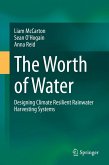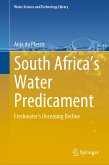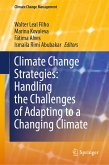Clean Water: Next Generation Technologies (eBook, PDF)
Redaktion: Jlassi, Khouloud; Chehimi, Mohamed Mehdi; Ismail, Ahmad Fauzi; Oturan, Mehmet A.


Alle Infos zum eBook verschenken

Clean Water: Next Generation Technologies (eBook, PDF)
Redaktion: Jlassi, Khouloud; Chehimi, Mohamed Mehdi; Ismail, Ahmad Fauzi; Oturan, Mehmet A.
- Format: PDF
- Merkliste
- Auf die Merkliste
- Bewerten Bewerten
- Teilen
- Produkt teilen
- Produkterinnerung
- Produkterinnerung

Hier können Sie sich einloggen

Bitte loggen Sie sich zunächst in Ihr Kundenkonto ein oder registrieren Sie sich bei bücher.de, um das eBook-Abo tolino select nutzen zu können.
This book summarises the recent, and future, sustainable, low-cost, environment-friendly and efficient systems for clean water production, to solve clean water crisis. We cover production of water the dew and rain or via desalination, Fenton processes or electrocoagulation; nanomaterial-based water purification methods including adsorption, catalysis, smart-sensors for pollutants detection and removal. We also cover environmental management, environmental policy aspects, and review recent patents and industrial processes to produce clean water. Written by experts in the domain of wastewater…mehr
- Geräte: PC
- ohne Kopierschutz
- eBook Hilfe
- Größe: 13.82MB
![Water Policy in Pakistan (eBook, PDF) Water Policy in Pakistan (eBook, PDF)]() Water Policy in Pakistan (eBook, PDF)121,95 €
Water Policy in Pakistan (eBook, PDF)121,95 €![Climate Change Adaptation, Flood Risk, and Beyond (eBook, PDF) Climate Change Adaptation, Flood Risk, and Beyond (eBook, PDF)]() Climate Change Adaptation, Flood Risk, and Beyond (eBook, PDF)121,95 €
Climate Change Adaptation, Flood Risk, and Beyond (eBook, PDF)121,95 €![AI Innovation for Water Policy and Sustainability (eBook, PDF) AI Innovation for Water Policy and Sustainability (eBook, PDF)]() Manish Kumar GoyalAI Innovation for Water Policy and Sustainability (eBook, PDF)40,95 €
Manish Kumar GoyalAI Innovation for Water Policy and Sustainability (eBook, PDF)40,95 €![Using NEPA to Combat Global Warming (eBook, PDF) Using NEPA to Combat Global Warming (eBook, PDF)]() David L. KeysUsing NEPA to Combat Global Warming (eBook, PDF)57,95 €
David L. KeysUsing NEPA to Combat Global Warming (eBook, PDF)57,95 €![The Worth of Water (eBook, PDF) The Worth of Water (eBook, PDF)]() Liam McCartonThe Worth of Water (eBook, PDF)65,95 €
Liam McCartonThe Worth of Water (eBook, PDF)65,95 €![South Africa's Water Predicament (eBook, PDF) South Africa's Water Predicament (eBook, PDF)]() Anja Du PlessisSouth Africa's Water Predicament (eBook, PDF)97,95 €
Anja Du PlessisSouth Africa's Water Predicament (eBook, PDF)97,95 €![Climate Change Strategies: Handling the Challenges of Adapting to a Changing Climate (eBook, PDF) Climate Change Strategies: Handling the Challenges of Adapting to a Changing Climate (eBook, PDF)]() Climate Change Strategies: Handling the Challenges of Adapting to a Changing Climate (eBook, PDF)121,95 €
Climate Change Strategies: Handling the Challenges of Adapting to a Changing Climate (eBook, PDF)121,95 €-
-
-
Dieser Download kann aus rechtlichen Gründen nur mit Rechnungsadresse in A, B, BG, CY, CZ, D, DK, EW, E, FIN, F, GR, HR, H, IRL, I, LT, L, LR, M, NL, PL, P, R, S, SLO, SK ausgeliefert werden.
- Produktdetails
- Verlag: Springer International Publishing
- Seitenzahl: 285
- Erscheinungstermin: 19. März 2024
- Englisch
- ISBN-13: 9783031482281
- Artikelnr.: 70201483
- Verlag: Springer International Publishing
- Seitenzahl: 285
- Erscheinungstermin: 19. März 2024
- Englisch
- ISBN-13: 9783031482281
- Artikelnr.: 70201483
- Herstellerkennzeichnung Die Herstellerinformationen sind derzeit nicht verfügbar.
